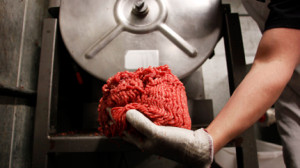During the April 16, 1996 Oprah Winfrey show, the host stated she would stop eating hamburgers because of fears over BSE or mad cow disease and that she was shocked after a guest said meat and bone meal made from cattle was routinely fed to other cattle to boost their meat and milk production.
 The camera showed members of the studio audience gasping in surprise as vegetarian activist Howard Lyman explained how cattle parts and downer cattle (downer is the generic term used to describe cattle who can simply no longer stand) were rendered and fed to other cattle.
The camera showed members of the studio audience gasping in surprise as vegetarian activist Howard Lyman explained how cattle parts and downer cattle (downer is the generic term used to describe cattle who can simply no longer stand) were rendered and fed to other cattle.
News of the popular show’s content swept through the cattle futures markets, contributing to major declines in beef contracts as traders feared it would turn Americans away from beef. Yet, when the U.S. Food and Drug Administration announced its ban on ruminant protein in ruminant feed, the move was widely praised as prudent given the severity of the consequences should BSE be discovered in North America.
Even the U.S. rendering industry, which in the early days of public attention after the March 20, 1996 announcement linking BSE to human deaths in the U.K. argued that negative public perception of the industry was simply a function of inflammatory language (one industry official, during a panel discussion in July 1996, said that part of the problem was that the word downer was a negative term; instead, industry was urging producers and others to describe such animals as non-ambulatory), eventually supported the measures, with the U.S. National Renderers Association quoted as saying the ban on mammalian protein in ruminant feed put “a protective blanket around the cattle industry.”
Shortly thereafter, Oprah, along with her production company and vegetarian activist Howard Lyman, were named in a $10.3 million lawsuit brought by Texas cattle ranchers.
Beyond the media circus in Amarillo, Texas, where the savvy Oprah taped her show during the trial in a star-studded appeal to public sentiment, the trial was the first legal test of food defamation laws, then on the books in 13 U.S. states.
Oprah won, not only in court, but in the court of public opinion.
In a if-you-don’t-know-history-you’re failed-to-repeat, Beef Products Inc. has not only filed a defamation lawsuit against ABC News seeking $1.2 billion in damages for misleading consumers about lean finely textured beef, more commonly known as pink slime, but has also demanded others turn over all e-mails about pink slime.
As reported by ABC, several food writers, including a New York Times reporter, have been subpoenaed by a meat producer as part of its $1.2 billion defamation lawsuit against ABC in regards to the network’s coverage of a beef product dubbed “pink slime” by critics.
 The subpoenas were issued to five writers — three reporters for the online Food Safety News, Times reporter Michael Moss and food writer Michele Simon — asking each to supply copies of any communications they had with ABC in 2012.
The subpoenas were issued to five writers — three reporters for the online Food Safety News, Times reporter Michael Moss and food writer Michele Simon — asking each to supply copies of any communications they had with ABC in 2012.
Beef Products Inc. sued the network in 2012 seeking $1.2 billion in damages for the coverage of the meat product the industry calls “lean, finely textured beef,” which critics dubbed “pink slime.” BPI said ABC’s coverage misled consumers into believing the product was unsafe and led to the closure of three plants and roughly 700 layoffs.
ABC’s attorneys say that in each of its broadcasts about the product, the network stated that the U.S. Department of Agriculture deemed the product safe to eat. They say BPI might not like the phrase pink slime, but like all ground beef, it’s pink and has a slimy texture.
Attorney Bruce Johnson in Seattle is representing the editor of Food Safety News, Dan Flynn, reporter James Andrews, and former reporter Gretchen Goetz. Johnson on Tuesday said the subpoenas were “overreaching” and that the publication would fight the requests.
BPI attorney Erik Connolly said the subpoenas are “appropriate and would be enforced.”
A spokeswoman for the New York Times said Moss’s subpoena had been stayed.
Simon said she has responded to the request, but did not provide any documents because she doesn’t keep emails dating back to 2012.
“BPI’s lawyers are engaging in a fishing expedition by spreading the subpoenas so far to every journalist and food blogger that has ever said anything about pink slime,” Simon said.
The plaintiffs have also sought subpoenas for two food-safety research labs and a blogger who has written about the meat filler.
In addition to ABC, the lawsuit names ABC news anchor Diane Sawyer, correspondents Jim Avila and David Kerley; Gerald Zirnstein, the U.S. Department of Agriculture microbiologist who named the product pink slime; former federal food scientist Carl Custer; and Kit Foshee, a former BPI quality assurance manager who was interviewed by ABC.
 The Administrative Appeals Tribunal found federal workplace insurer Comcare had no liability for her ill-health as it could not be certain the type of virus, where it had been contracted, or if it could cause chronic fatigue syndrome.
The Administrative Appeals Tribunal found federal workplace insurer Comcare had no liability for her ill-health as it could not be certain the type of virus, where it had been contracted, or if it could cause chronic fatigue syndrome. But Comcare did not accept that the illness had been caused by her employment or that she contracted Coxsackie B virus at the conference.
But Comcare did not accept that the illness had been caused by her employment or that she contracted Coxsackie B virus at the conference.










